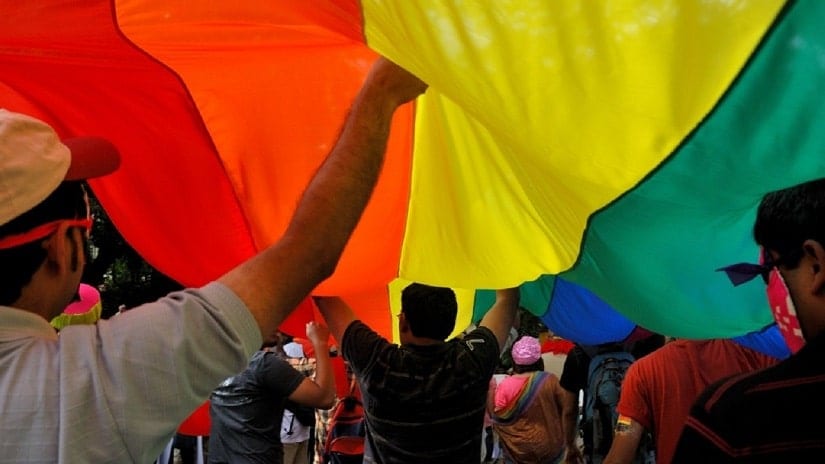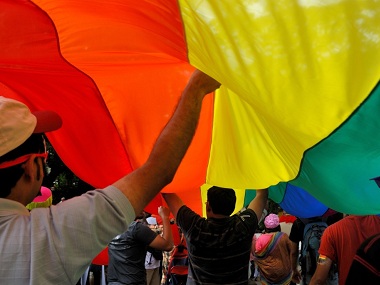The Queer Take is a fortnightly column by poet-writer Joshua Muyiwa. Read more from the series here . *** The last Sunday of November is nearly upon us. Twelve years ago, at the first Pride March in Bengaluru, I had no idea what to expect from it, having only been to protest marches until then. What does one wear to it? I asked myself, and settled on my everyday look. I wore Methiyadi slippers, black ladies’ skinny jeans from Splash and a cut-up tee with an imprint of the Tree of Life on it from an export surplus store. My closest friend at the time wore black skinny jeans with a black shirt with rolled up sleeves and buttons open till his navel. And another friend — someone who had lived abroad and travelled a lot — came prepared with an outfit and wig changes. Quite early in the march, I picked a pink wig with a bob-cut; my all-black wearing friend picked a long, Cher-style one; and the friend with the alternative looks put on a pink Afro wig. It was strange; it started with a slight hesitation in the air, and quickly — with the help of drummers and the hijra community — it turned into a moving dance party through the streets. [caption id=“attachment_7690321” align=“alignnone” width=“825”]  Has the Pride March shifted from being a vehicle for the community to a mode for corporate, liberal agendas to find root? | File photo. Image for representation only[/caption] One of the moments that stood out for me from that evening more than a decade ago was standing on the steps of the imposing Sir KP Puttanna Chetty Town Hall and looking down at a swirling mass of hijras thrumming, throbbing together like a single glorious, glittering gorgeousness to the dappankuthu beat. We three friends rushed down the steps, slipped into this surging creature. And then, it seemed like there was nobody on the steps, every one of us over a thousand strong were pulsating like a single, sinewy, sexy beast. It was a rush. (Lately, all my stories in my everyday seem to burrow back to the body for that moment of origin, for that first smack of realisation that there was possibility, there was politics. In the telling of my stories, words that give these times meaning seem to come much, much later.) It wasn’t that I hadn’t already achieved this kind of raw vigour in my life. It was that there is a maddening joy that comes from being part of a chorus. In looking back at that duration of synchronised stomping, I’m coming to see that I learned that the definition of community equals people who move together. And if you’ll allow me more melodrama, I’ve not felt that way in the midst of my brothers, sisters, friends and lovers from the community in that magnanimous fashion in a while. There are sometimes sparks of it and I relish them. But I’m greedy like everyone else and I’d like some more. Each year, I’d go to the Pride March following the same template as my first one — I’d just make a twist on my everyday look. I mean: Let’s be real, I wasn’t dressing down the rest of the year, and I don’t need an annual reason to dress up. But I’m always excited to see what everyone is wearing to the event. My only wish was some of it would spill into the everyday too but it never did. For that single day alone, transgressions from our own were celebrated by all. The muscle Mary in a maxi-dress only shows up on this day. On every other day, he is “no fats, no femmes, no darkies”. It isn’t just the enthu-cutlet photographers with their telephoto lenses that fetish our pride, it is our own that also put glass shards in our powder-boxes. From those years of not knowing to knowing has been quite the dulling of the blade. We don’t dance at the bottom of the steps anymore, instead we have speeches. It isn’t that one is better than the other, it is that both don’t seem to be able to exist at the event anymore. Don’t get me wrong, there is always dancing at the gathering of the queers, but now it is on a stage, lights are hired, recorded music is blasted and we’re the audience. The invitation for us all to move has been rescinded. Over the past four years, I haven’t been to the Pride March, and I’m going to be missing it again this year. I haven’t been in the city at these times. (One time I was in Delhi and didn’t go to the Pride March there either but I did go to the after-party, does that count?) I’m not diminishing the importance of this day; I’m interested in the way it has changed in its text, tenor and tone. Maybe it needs to be re-examined? Maybe I’m deaf and I can’t hear the raucous rioting that it is anymore? Maybe I have been nutritioned and strengthened by the previous Pride Marches and don’t need it to propel me anymore? Maybe it has shifted from a vehicle for the community to a mode for corporate, liberal agendas to find root? Maybe it still has the frisson for those who don’t live their mundane desires in the constrictions and contradictions of city life? Maybe it has become another mechanism of modernity and has swayed away from the primal notions of pride despite the other? And to all those who haven’t been to a single Pride March: fear not. And also, you don’t have to go — attendance isn’t compulsory. In the everyday tasks of learning, of teaching yourself, to move through the obstacles in your own life, one can find the single beat that others like us are moving to, we can slide in, and we can be proud too. And to all those marching, let me know why you still do it. I really want to know. Maybe, I’ll be there next year then. Joshua Muyiwa is a Bengaluru-based poet and writer
I’m not diminishing the importance of the Pride Parade; I’m interested in the way it has changed in its text, tenor and tone | Joshua Muyiwa writes in this week’s #QueerTake
Advertisement
End of Article


)
)
)
)
)
)
)
)
)



